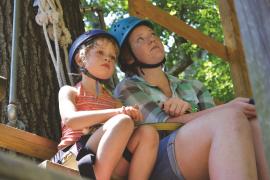Ant colonies have been used throughout history as models of industry. As a collective, ants are efficient, surprisingly intelligent, and are among the very few animals that organize themselves to collectively carry loads far heavier than an individual member of their species. Ants working together have an astonishing ability to mix collective muscle with individual initiative, and can adjust their course and outcomes based on intelligence provided by a single ant joining the effort.
So, imagine an army of ants harvesting those collective strengths, but instead of gathering food for the colony, they’re raising money for your camp . . .
Anyone can be part of your fund-raising efforts. Yes, anyone. This concept may be difficult for some as, traditionally, fund-raising and seeking in-kind gifts and volunteers has been a very top-down directed activity, often a function of designated staff. But consider for a moment embracing a broader construct; in its simplest form, the more ants working on your behalf, the more opportunity to raise money and support for your camp. Over time the ants will organize their search, optimizing the best path between the camp and the cash and/or other donations of time and services. As more ants join your fund-raising network, more and more ants are attracted and working on your behalf, creating a self-reinforcing efficiency effect.
Who Are Your Ants?
Everyone who has a connection to, belief in, or passion for your organization can be an ant in your asking army — don’t limit the vision of your fund-raising and support efforts to just paid, professional staff, CEOs, or board members. With training and a plan for participation, those who are already part of your camp’s (school, organization, etc.) community can play an integral role in asking!
All Ants Exist Within a Connected Community
So do you. For example, all of your current and former campers, camper families, customers, students, participants, volunteers, etc., are in your network; you already have a database of prospective askers, so take advantage of it. Again, those you have served/are currently serving are already fans of your work — expand these relationships and get them raising funds and support on your behalf. Creating your asking-ant-army is not about treating your board members like an ATM. This is about expanding relationships so others can participate in asking for funds, services, and/or time; not just being solicited to give them. Expect participation from your own clientele.
Networking
The real ant intelligence is in the collective. An individual ant has an idea of how to pass an obstacle but lacks the power to move the load; the group of ants can amplify her strength so that the idea can be implemented.
In pretech times, this was referred to as getting folks to “open their rolodex” — allowing organizations to build lists of contacts and connections. In today’s high-tech, socially connected society, something as simple as asking those you know to post your message asking for funds and/or gifts of time or services on their social media can yield results. However, while technology and social media have made broadening connections easier, networking efforts still must be intentional, thoughtful, and purpose driven.
Ants in one colony will frequently use information from another to find and use resources. Collaboration with other like-minded organizations can also be a great way to expand your network, visibility, and fund-raising opportunities. Collaboration can be especially helpful if your camp is fund-raising for the first time, or if your operation is new or small and you don’t yet have a large database to pull from.
Training
To find your best success — and create fearless askers — training has to be planned and prioritized. For example, everyone involved in your fund-raising and/or volunteer recruiting efforts needs to be able to articulate clear and consistent messaging as to why the organization needs funds or other donations of time or services. Even your youngest youth who is working the fund-raising car wash should be able to tell the customers where the money is going. Training should also be specific to the role(s) assigned to the individual. Those working on a special event or on expanding social media need different training and support than those making fund-raising videos or soliciting in-kind services.
While anyone can ask for money, not everyone is comfortable with the task and for many, asking for money can be awkward and intimidating. For those making direct cash asks, training should include as much role playing of “making the ask” as possible, giving them opportunities to practice face-to-face interactions (including rejection). Starting off with simple and/or group asks and building to more complex one-on-one asks will help build confidence. One example is to split the trainee group giving one half (prospective funders) an assortment of candy (or other resource) and the other half (askers) instructions to make their case as to why those with the candy should share it. The group with the candy must decide to give or not based on the strengths and weaknesses of the appeal.
A more advanced curriculum will include practicing one-on-one asks, ideally utilizing a script of your camp’s real funding needs, including practicing with your experienced volunteers, staff, board, or supporting community members. Once they are trained and ready, when possible have inexperienced askers go with those who are experienced to observe, assist, and gain more confidence.
Simplicity
At least in the very beginning, as you build your army, stick to the basics. After all, many of the individuals with whom you will be working are going to be inexperienced in all things funding. Remember, this is a building process — it will take time and support (both of which may be considerable). As your ants get their feet wet (and to maintain your sanity in the process), it’s important to keep things simple and straightforward.
Some things to consider:
- Create small asks and short tasks to encourage participation and help ensure success.
- Break your fund-raising plan/tasks into smaller “bites” so people don’t feel as overwhelmed.
- Start with what your army is either most excited about and/or most able to do first (such as a smaller-scale special event, collaboration with another organization, etc.) that will allow them to find success and feel good about the efforts — building confidence for future involvement.
- Focus first on what already works well before adding new projects.
- Look for the “low-hanging fruit.” What is right in front of you? What is easiest to harvest?
Attitude
Ironically, one of the hardest concepts in fund-raising is actually asking for the money. Certainly, training is one critical aspect of building confidence in this arena. Attitude is another. Your army needs to be fearless in its asking ability!
Acknowledge that, for some, asking for a donation equates to begging (which may be internalized as embarrassing or shameful), so it’s critical to address this topic in training and allow for honest conversation. The reality for your organization is any variation of “I hate to ask this, but . . .” cannot be part of your fund-raising efforts. Those who are raising funds for your organization should never apologize for asking! Rather, fund-raisers should be unapologetic about asking for money for the organization. Your camp is doing great things and is deserving of support. Fund-raisers should feel empowered; if you know you’re great at what you do, don’t ever be ashamed to ask.
Roles Should Be Clearly Defined
Every ant has a specific job; fund-raisers as well as those seeking gifts of time or services should have clear job descriptions that define their participation. Define tasks that will be “staff only,” require your most experienced “A Team,” or which will be assigned only to those with a specific skill set — such as grant writing. For example, corporate asks may be reserved for specific individuals, wherein social media campaigns can be shared work. For those considering starting a fund-raising board, be sure to define those roles very specifically, including how they relate to the organization’s governance. For organizations with an existing board of directors separate from the fund-raising board, be sure to clearly define operational roles for each, and consider naming the fund-raising group something other than “board” — fund-raising champions, heroes, etc. — especially if their sole function is fund-raising.
Mission Matters
Before deploying, all your ants need to understand and be able to articulate your camp’s/organization’s mission and the purpose of their fund-raising efforts and requests for other gifts of time or services. Why are you raising money? What will the additional resources be used for?
Ensure consistent messaging by creating easy-to-use, bullet-point fact sheets.
Provide links to supporting outcomes and research so those who want more in-depth information have access to it.
Make sure your mission is clear in all your media — printed materials, website, etc. — and clearly spells out who you are, what you are doing, and why it’s important.
Youth Are Powerful Assets and Should Be Included
Most youth who have benefited from attending your camp (school, program, etc.) have the capacity to participate in fund-raising and other efforts — even if it’s something simple like coloring a thank-you card for a donor. Some organizations have up-front expectations that youth and/or families participate in service, fostering a belief that those who benefit from the generosity of others have an obligation to give back. For those serving youth (and families) in economically challenged circumstances, take care not to discount their participation automatically. While some may not be able to provide monetary support, they are often eager to demonstrate appreciation for the opportunities/services provided and want an opportunity to participate in your camp’s community.
Perhaps the greatest power of including youth participants in fund-raising efforts lies in their stories. Storytelling is possibly the most important aspect of raising money, and who better to tell their own story than the youth themselves (when it is appropriate to do so). Let’s face it, kids keep it real and appeal to the heart in an honest way. Let them capture their own stories in a video or other medium. Let them contribute to the newsletter, blog, or website. Or better yet, ask them for their ideas on the best way to share. They know why you are important to their lives.
|
Webinar - Building An Army of Asking Ants
Wednesday, January 24, 2018, 1:00 PM- 2:00 PM EASTERN Register Now |
Diane Tyrrell, CCD, MA Ed, is a former member of ACA’s National Board of Directors, served as a member of the ACA 20/20 Strategic Planning Task Force, and is the volunteer editor for Camping Magazine’s 20/20 Toolbox Article Series. She has written numerous articles for Camping Magazine and is the author of the book 101 Games and Activities for Canoes and Kayaks. Diane is CEO of Frog Pond Consulting, working with camps and schools. She can be reached at [email protected].


